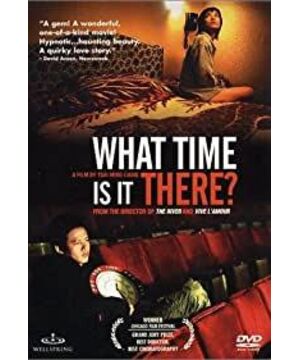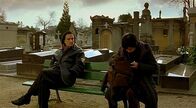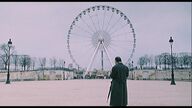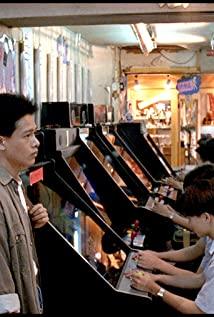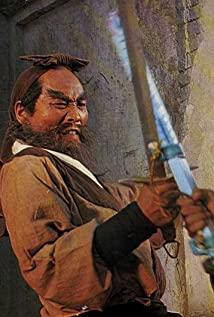The similarities are summed up in one word: loneliness.
The first film I came into contact with was "Youth Nezha". The background music of "Den deng deng deng deng deng..." and the temperament of the story are simply too addicting! Then came "A Cloud in the Sky", "Long Live Love", and "Face", but only later did I know that because of the relationship between Xiaokang as the protagonist, his movies are actually in sequence. "What Time Are You Over There" should actually precede "Heaven" and "Face". At first, "Qing" gave people a very strong feeling. The feeling of sullenness had been brewing before, knowing that it would explode, and waiting for it, but it turned out that there was no so-called concentrated orgasmic eruption point that made people remember it fresh. In retrospect, it was the stuffy spots scattered throughout the film that were more powerful, such as the slippers floating in the kitchen, the moment when a hammer smashed the car window, and Xiaokang eavesdropped on his parents' conversations and skipped cram school... I recently saw an article saying that persistent emotions can affect people's facial expressions, and in the long run can cause changes in appearance induced by environmental factors. When I saw Xiaokang's face, I felt that it was a mask that was solidified by loneliness. Movies are a collection of image representations, and the face is the most important means of expression. Isn't it just because of the appearance of a well-off person that they have the same breath as their companions all the way? Well, Li Kangsheng is the first lonely symbol. Secondly, the second symbol, empty sensuality. "A Cloud in the Sky" and "Long Live Love" both tell that modern people turn to lust for temporary sustenance and comfort because of boredom and emptiness. "Heaven" is actually a continuation of the story of "What Time Are You Over There" The heroine has changed from the object of love far away in France in "You" to the object of sensual appeal that is close at hand, and with the plot of singing and dancing, there is a bit of modernist stream of consciousness color. In this fantasy, it is also Cai Director Rang. The way the well-off is released. So in fact, what Cai describes is more focused on describing modern people who have been hollowed out by busy urban life, and the way to solve the hollowness in their hearts - sensuality and fantasy. In "Long Live Love", Amei's 6-minute cry at the end is about loss and isolation. The house can't be sold, it is the pressure of survival, and A Rong is also limited to the body, it is the loss of love, so it is called "Long Live Love" , which aims to question how the masses who are trapped in a harsh living environment in modern life, when all their time and energy are devoted to the brutal battle for survival capital, how to maintain their enthusiasm and belief in love ? The real world is the world of interests, and the pursuit of love is the spiritual world. Buying ashes, buying a house, buying clothes, they are all bottom-level sellers in the real-world interest chain, and non-creative work means simply using time Time is exchanged with energy and money, in order to continue to survive, the only life capital is used in exchange for the cost of living in the world, repetition and cumbersome wear and tear of spiritual yearning, manic depression adds fuel to the fire, spiritual pursuit is transferred to physiological needs , then the love presented in their eyes may have been the simplest mode of behavior that has been tailored. That loneliness became an embarrassing situation that was repeated over and over again. It can be seen that although Cai described the state of loneliness, he mostly took a negative and gray attitude. In him, loneliness was transformed into boredom, boredom and helplessness that grew up due to depression.
In Murakami's novels, compared with Cai's negative attitude towards loneliness, Murakami has a positive evaluation of loneliness. In Murakami's novels, most of the protagonists are of the same kind, with no cares, no relatives, no reason, alone in the world, but also at ease, living a comfortable solitary life like a cat (the image of a cat basically also appears in every one of his novels. In this work, it seems to be a soft spot for me), and I am afraid that this quiet life will be broken by foreign invaders and disturb the fulfilling spiritual world that I have established. This is not unrelated to Murakami's character. He is a long-distance runner (I remember another Japanese long-distance runner said: "long-distance running has the beauty of being lonely all the time."), runs a few kilometers of marathons every day, in "When I Run, I What are you thinking?" also revealed his personal regular schedule, going to bed at ten o'clock and getting up at five o'clock every day, running for two hours, writing for three hours, and "making a living quietly with his wife and cat". A wonderful novel is an independent world that is different from the real world, so as a novelist who wants to imagine a new world, his isolation is the premise of creation, and his regularity reflects his desire not to be disturbed too much by the outside world. Therefore, although his novels say that the protagonist is lonely, the author's attitude always affirms this loneliness, and instead resists being swept into a world with too many interpersonal relationships. This phenomenon can be explained by the words of Sheldon's mother, saying that there are two types of people, one is inner-directed and the other is external. People with internal control are more closed and less willing to negotiate with others, because they have a self-sufficient spiritual world in their hearts. They feel joyful and fulfilled when they swim in it, so they don’t need other external factors to fill it, and they don’t care much. Other people's views, such people are more common in scientists, novelists, like sheldon. External control is just the opposite. They like to socialize and talk, care about other people's opinions, and evaluate their own behavior through the impression they leave on others. Self-knowledge follows the theory of "me in the mirror". They have lost a mirror to mirror themselves, and they don't have a complete spiritual world that can provide enough supply materials, so once they are lonely, they will obviously feel empty, so they will consciously avoid the state of loneliness. This type of person is more common. . There are too many, such as penny. Closer to home, the charm of Murakami’s writing lies in the praise and enjoyment of loneliness. I think that enjoying loneliness is also the only way for human evolution in the trend of modern civilization, from sensibility to rationality, from agricultural society to industrial society, from villages. Familiar with strangers in society, from ritual society to legal society, the larger the population is, the more strangers there are. And the constraints expressly stipulated by the law to maintain public morality and order, the threat of trust will always exist, because the space is so large that people will always worry about the possibility that someone or something will disappear in a second, so where should the constant of personal life be attached? Woolen cloth? The answer to Murakami's novels lies in this. When you feel powerless to the extreme, your participation in the outside world must be adequate. Loneliness is not a bad thing. Quietly cultivate the inner farmland. Consolidating the inner world is also an Eastern philosophy of doing things. Loneliness can actually be beautiful, as Jiang Xun said in "Six Lectures on Solitude", "Perhaps, the essence of aesthetics is loneliness."
As for Wong Kar-wai's films, he puts personal loneliness in a connection between people, forming an atmosphere between them, that is, a sense of alienation. So he is not talking about what happens to one person's loneliness, but is exaggerating the scenery presented by the loneliness of a group of people. His expression technique is different from Cai Mingliang's dullness. He will show his personal loneliness very well and handle it artistically. For example, the young police officer in Chongqing Forest, the kind of loneliness played by his girlfriend, whether it is Jin Chengwu or Liang Chaowei, they are different from Xiaokang, Xiaokang is too powerless, but Xiaokang has ties and roots. The characters in Wong Kar Wai's films are more like gorgeous wandering souls traveling between cities, suspected of being narcissistic and pretending to be lonely. Including Wang Jiawei's choice of actors, many of them are stylish and stylish, such as Leslie Cheung, Maggie Cheung, Faye Wong, Tony Leung, Takeshi Kaneshiro, Brigitte Lin... They are all ritualized actors, and they will bring out their own aura between their gestures. The characters get together, and it's just their natural chemistry with each other that's interesting. So the loneliness in his films is a dramatic romantic interpretation, including the aesthetic experience brought about by the alienation created by the scattered lenses. It is a dose of loneliness. He likes to use some romantic lines to support a loose story, and this looseness just fits the rhythm that the gorgeous loneliness needs. Different from Cai Li's loneliness and emptiness of the lower class, he is more of a boring show of lonely literary petty bourgeoisie. It is suitable for montage, and the real emotion will be less, but the illusory splendor is still very lame. It pays great attention to the over-quoted one-sentence summary of the movie - "The essence of the movie is a dream."
View more about What Time Is It There? reviews


